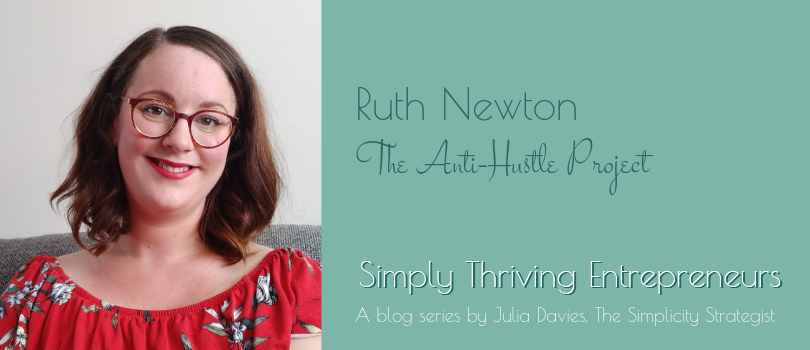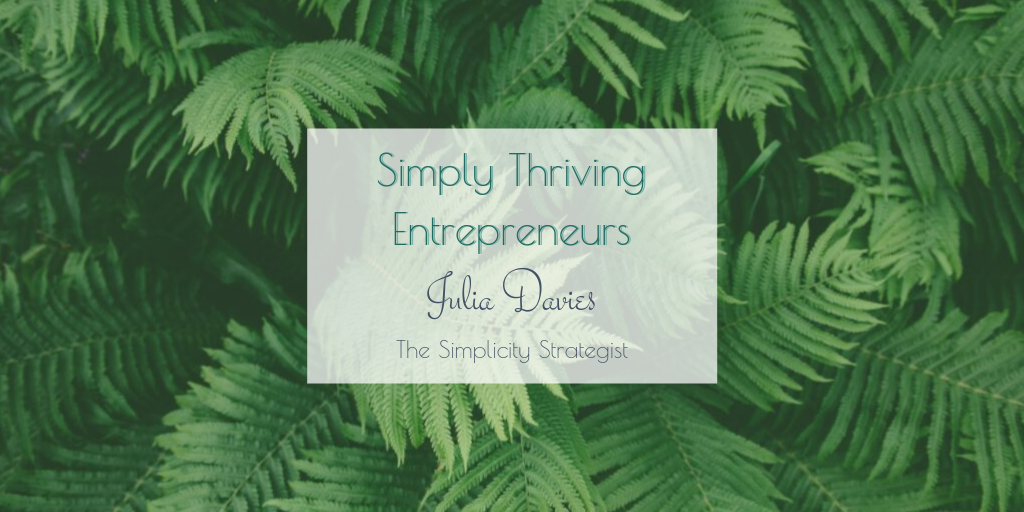May I introduce you to Ruth Newton of the Anti-Hustle Project. I’m absolutely thrilled to be hosting a new series of blogs celebrating female entrepreneurs who are simply thriving. It’s my aim to bring you a varied range of stories featuring women who are living life on their own terms and shunning the idea that life has to take a back seat when you run your own business. Although these women will share their tips and advice, I hope this blog series also inspires you to do things your way – to carve your own path. Click here to see the first interview and to read a full explanation of what a Simply Thriving Entrepreneur is.
Ruth Newton
Ruth is a guiding light in the world of running a business that works for you. She is also incredibly supportive of the community she’s built up on Instagram. The Anti-Hustle Project is an excellent resource for women who need to give themselves permission to put health and lifestyle over chasing money and a high-flying career. Ruth is down to earth, open and honest about her journey. She has first-hand experience of burnout, and shares her daily musings about where hustle crops up for her, both in business and in life. My favourite part of this interview is Ruth reminding us that the self-imposed deadlines that we give ourselves are almost always moveable – the washing can wait, playdates can be rearranged, and even clients will often be flexible if asked. Let’s take the pressure off ourselves in all areas of our lives – please do follow Ruth’s journey for inspiration.

Tell us a bit about yourself and what you do
Hi there. I’m Ruth, an introverted, animal loving homebody! In terms of what I do, I do multiple things which means I find this question super hard to answer.
I’m the founder of the Anti-Hustle Project (AHP). I started it when I had to close my relationship coaching business due to burning out and having a relapse of my Chronic Fatigue Syndrome (CFS). It started as a blog dedicated to exploring how to run an online business without working all the hours. Over time it has developed into something much bigger than that. This was because I realised hustle culture shows up in all areas of life, not just the online business space. I wanted to explore what it means to live a fully anti-hustle life and support people to do the same.
I currently don’t offer many paid services through AHP, just my Patreon community. My income is generated through co-running a business with my husband, focused on providing data protection support to SMEs and managing our Airbnb holiday rental property.
When I’m not doing those three things, I spend a lot of time with my two dogs, making my house nice and resting up. At the time of writing I’m pregnant with my first child, so that’s going to be a huge change to my life as well.
How do you plan your day/week?
It’s taken me so long to find a happy balance with planning my days and weeks. In my previous business I had an overly rigid routine with a fully mapped weekly timetable and lots of goals and checklists to work through.
When I burnt out, I realised that very rigid structure contributed to it because it put me under so much pressure to perform all the time. Since launching the Anti-Hustle Project I’ve taken a more relaxed approach to my planning.
My normal planning is by daily themes. Monday is my planning and organising day, which includes household chores and jobs that need doing as well as getting myself geared up for the week. Tuesday is business development day, where I focus on training and developing anything I need for the Anti-Hustle Project. Wednesday is my content creation day, where I schedule any blog and social media posts and write my email newsletter. Thursday is for connection, so I plan Skype calls or coffee dates with other self-employed people. Friday is my day to focus on my other ventures, doing the admin and finances for the businesses I run with my husband.
I found having themes gave me enough structure to focus me and take the “what should I do today” decision fatigue away, but also allows me to be flexible enough to manage my energy when my fatigue is bad. And life is never that straightforward so some tasks get moved between days, but this is always the routine I come back to when things feel a little off-kilter.
On Mondays I sit down with my bullet journal and map out what appointments I have over the coming week and then list the tasks that need achieving that week. This includes scheduling in my exercise.
What does success look like to you?
When in hustle mode my definition of success was very outcome based, wanting to achieve x income, have so many email subscribers, going to the gym 3 times a week. This stuck me in a state of constant pushing and chasing to achieve these things.
These days I have much broader criteria for success. These include doing meaningful work, having plenty of time to rest, being able to grow and change as a person and trusting myself. It also includes living within your means, and not be prioritising money over everything else. Compassion and a sense of ease within myself sit over all these things. I want to ensure I don’t become to rigid with my measures.
What does self-care mean to you, and how is that reflected in your life?
For me, self-care is about doing the things that are best for me, even if they aren’t the nicest things to be doing.
An example of this is going to the gym. When stuck in hustle mode exercise became something to cram in. I would focus on high intensity exercise, aiming to get the biggest “bang for my buck”, to optimise what I was doing. When I burnt out, I stopped doing any exercise at all, choosing instead to lay on the sofa and watch Netflix, all in the name of self-care. But that wasn’t actually what was best for my health, either physical or mental.
I eventually realised that consistent gentle exercise actually made me feel better and have been building up a consistent exercise habit in a way that works for me since. Going to the gym is never the easiest thing, I’d still rather lay out on the sofa with my dogs! But I know it’s the thing that’s best for me in the long run.
I can be easy to get sucked into the commercialised version of self-care, with lots of scented candles, bubble baths and chocolate. And they’re all great things. But doing the hard things, like going to the gym, having counselling and asking for help from people have been the things that have made the greatest improvement to my wellbeing.
Looking back, is there anything you would you change about your first year in business?
I’m going to answer this from the prospective of my first year in my relationship coaching business. Because there are many things I would change if I could go back to then.
Firstly, I’d go out and get a part-time job to do alongside setting up the business. My husband and I decided I could quit the work I was doing to focus on coaching. But that put too much pressure on me to get the business up and running quickly. I didn’t thrive under that pressure. I wish I’d found some income from somewhere else so I could take my time to set the coaching business up in a way that felt sustainable for me. Who knows, if I’d done that maybe I’d still have the business.
The second thing I’d do is hire a good business coach from the beginning to help set strong foundations. I tried to do it all myself, which sent me down the rabbit hole of online information. That led to information overload, a lot of scattered behaviour and ultimately the burnout that caused me to close that business.
With both the above it’s critical to know yourself, how you work best and what you want from life. I had some terrible coaching experiences because I worked with someone whose method simply wasn’t the right one for me. If I’d spent more time reflecting on who I am and what I wanted I may have been able to save myself a lot of money and hurt in the process.
What boundaries do you have in place regarding your work/life balance?
Boundaries have always been a big thing for me. In my previous work I was always the one who left the office on time and used to work 4 days a week so I had more time to do the other things I wanted to do in my personal life. At that point my boundaries were very clear lines and I’d very rarely cross them.
Recently I’ve become a lot softer with my boundaries. There are still a few definitive ones, such as not working at the weekends, waking up at the same time every day and working in my home office (I’m terrible for thinking I’ll work on the sofa and then not being very productive!) Everything else I’m more flexible with though, to allow me to accommodate my energy levels, which are very variable due to my CFS and pregnancy.
I now have a few guiding principles that I follow but I’m more flexible about how they fit in. The guiding principles are:
- Go to the gym at least twice a week
- Spend weekday mornings in the home office. I aim to get to my desk between 8am and 10am depending on what else is going on
- If tired have a nap, don’t just zone out in front of the TV for hours
- Go to bed as close to the same time as you can every day
What’s the best and worst thing about working for yourself?
I couldn’t imagine not working for myself now. The best thing is being as flexible as I want with my time. When I worked in an office I was exasperated by presenteeism culture. I wanted to do what needed doing while I was there and then leave when I’d finished. I didn’t see the point in trying to make work fit into the arbitrary hours of 9to5. Now I have days where I work 8 hours and days where I work 2. It all depends on what needs doing and how I’m feeling.
When it comes to the worst there are 2 that jump to mind. The first is how people who aren’t self-employed often don’t get it. They think being self-employed it this easy jolly, where you lay around in your PJs and do whatever you want. They massively overlook the strength it takes to get yourself up and working everyday when you’re not accountable to anyone, the stress of managing fluctuating income and paying your own tax and the resilience required to constantly put yourself out there, either through pitching for work or constantly creating content.
The second is moving away from a time for money model of working. Life is much simpler when you know that you’re paid X amount of money for X hours. I’m currently in a position where my income comes from about 3 hours work a week. It’s not a huge income but it’s a bloody good hourly rate if you divided it by 3! But businesses don’t work on hourly rates. This makes setting prices for your services bloody hard. It also makes me feel like I’m not really working because so much time is spent on things that aren’t “income generating.”
Please can you share a top tip for an overwhelmed entrepreneur
Reconnect to what you want and what you’re trying to achieve. So much of business is looking out. Out to existing clients, out for new clients, out to other businesses, out to social media. This creates so much extra noise and can make it really hard to know what needs to be prioritised. It can also make you feel like you’re not coping because you’re comparing your insides to someone else’s highlight reel. By stepping away from everyone else’s expectations, it’s easier to see what’s important for you and discard anything that isn’t.
Additionally, I’d like to add that it’s unlikely that anything you’re doing is life or death, so it can wait. We get so hung up on deadlines like they’re the most important thing in the world. They can always be pushed. No deadline is worth making yourself overwhelmed or ill for. Your clients won’t mind if you push something a week. Your washing will still be in the basket if you leave it a few days. Play dates can be rearranged. It’s completely ok to take some stuff of your plate.
Where can we find you online?
Instagram: https://www.instagram.com/theantihustleproject/
Website: https://www.antihustle.co.uk/
Anti-Hustle Community: https://www.patreon.com/antihustleproject




Pingback: The Great Hustle Debate: Is More Always Better? - Mastermind